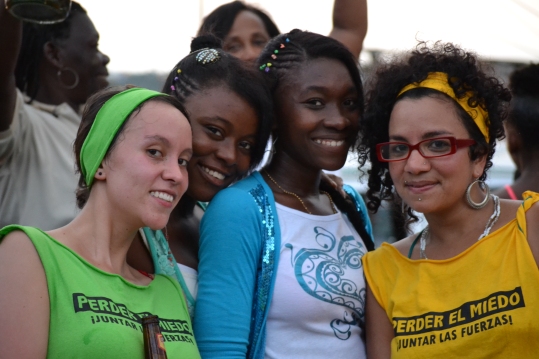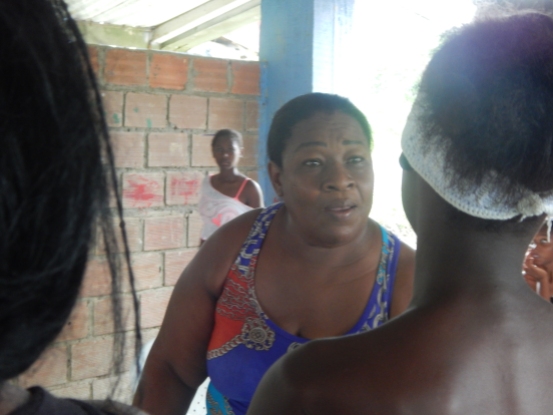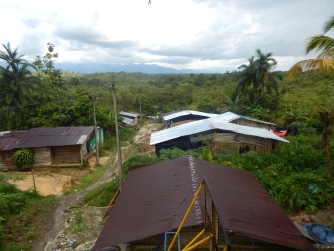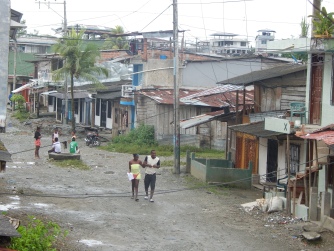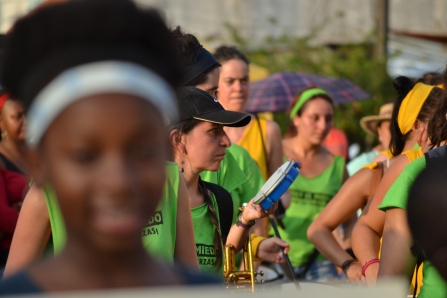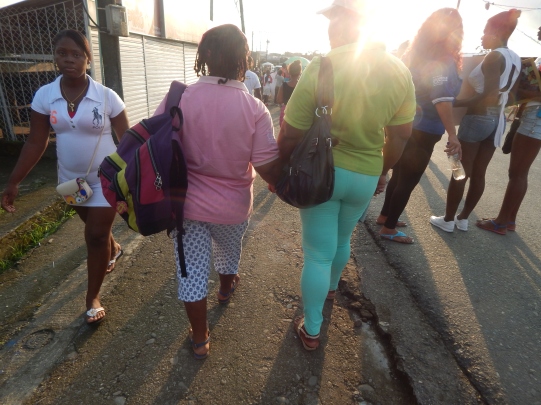David Sulewski, together with his wife Tibrine da Fonesca, works with MCC in Quito, Ecuador, coordinating the Refugee Project, a ministry of the Mennonite Church in Quito to refugees, the majority of whom are fleeing from the armed conflict in Colombia. This post was taken from their personal blog, Gathering Peace and is the fourth in a series.
Part One, Part Two, Part Three
Imagine the daily stress and fear of living in a neighborhood occupied by warring armed groups. You want nothing to do with them; you keep to yourself, going about your business. Imagine one day a group of armed men knock on your door, demanding that you give them something to eat. You know that the other group will most likely find out and accuse you of supporting the enemy. But, in this moment, the men standing at your door are threatening you and your family if you do not feed them. Imagine.
This was the very dilemma that a young woman in Buenaventura had to face, and she paid heavily for the choice she was coerced into making. She gave food to one group one day and the next she was shot in the back by another. Though she survived, she is paralyzed from the waist down.
On my last day in Buenaventura I went with Mari to visit this young woman who lives in a small community along the highway on the outskirts of Buenaventura. We sat with her and her husband, as their children played on the hard packed dirt floor inside their wooden shack.
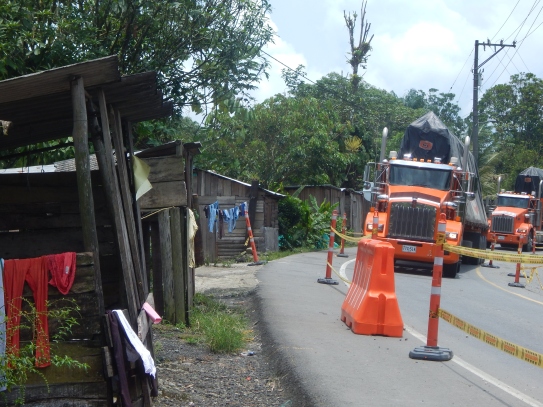
With the highway expansion project underway, the encroaching road runs just a few feet from peoples’ homes. A resident said that it feels like an earthquake is shaking her home every time a truck drives by. Photo by David Sulewski
Mari exudes a charisma that puts people at ease and easily earns their confidence. She listened empathetically, engaging the family with direct questions to fully understand their situation. She spoke encouraging words and then asked: Do you want to try to bring to justice the man who shot you?
As we left, Mari told her that the next step will be to share her situation at the upcoming case review meeting. Twice a month the Mariposas meet with government and non-governmental agencies to discuss cases and strengthen the legal, medical and humanitarian response to the crisis of violence. They also document cases of gender-based sexual violence to raise the visibility of this severely underreported crime.
Heading back into the city, Mari dropped me off at the entrance of a barrio where Rut, another Mariposa, was waiting for me. Mari informed me that this was one of the most dangerous barrios in Buenaventura. Here, the presence of the armed groups is strong and police have discovered casas de pique and unmarked, mass graves.
Rut and I jumped on the back of taxi motorcycles and sped down the dirt road, kicking up rocks and dust as we turned corners. We arrived at her house where she waved me in and sat me down at the table to eat a steaming bowl of fish soup with a heaping plate of coconut rice she had prepared.
“I, too, am a victim of the conflict,” She shared. Even now, as an outspoken Mariposa, she continues to receive threats. “They persecute me because I am like a stone in their path.” Looking around her home, resting her gaze on the photographs of her beautiful children hung on the cool cement walls, she said, “This is my home. I sacrificed so much to build it. I will never leave here.”
After lunch, we walked across the street to the community center (which she had built when she was president of the barrio) to lead a workshop for teenagers. For an hour she commanded the teenagers’ attention, leading them in community building and public speaking activities before facilitating a discussion about the Colombian laws that protect victims’ rights.
When the workshop was over Rut took me for a walk around her barrio. Indisputably a recognized and respected pillar of the community, she stopped to greet everyone we passed along the way. Further along, the road led to the barrio’s border at the forest’s edge. Waving her hand in the direction of the dense woods, she said, “Over there is the site of a massacre.” Just on the other side of the road, children played soccer on a dirt patch. Despite the armed groups living in her barrio, Rut is committed to her community. “This is my home,” she asserts, tapping her foot on the ground, “I won’t leave this place.” Like many of her fellow residents, Rut has already been forced from her home once in her life when she fled the violence in the neighboring region of Chocó back in the 1990s.
We looped back to her house to join up with a group of Mariposas to walk the rest of the way together out of the barrio to the main road where La Tremenda Revoltosa was preparing for their last demonstration. In the group I met Ana, Rut’s successor as president of the barrio.
Along the way, Ana called out to people sitting on their stoops, inviting them to join the rally. She stopped to introduce me to a young woman standing in the doorway. As we shook hands I noticed she had a tattoo of teardrops under her eye. “Come on, join us,” Ana encouraged her. “Maybe”, she replied flatly before stepping back inside. Once we were out of earshot, Ana leaned in to tell me, “Here, we respect everyone.” Respect is a good strategy for protection in a violent barrio, but it can also allow for an opening to a conversation that invites a decision to walk an alternative, peaceful path.
Emerging from the barrio we regrouped with La Tremenda Revoltosa for another festive, musical march for peace in Buenaventura. The march went down the main road and then looped back to the very entrance to the barrio where Mari had dropped me off only a few hours earlier that afternoon. As it began to grow dark, the rally concluded and La Tremenda Revoltosa piled back onto to their bus to head home. TheMariposas then began flagging down taxis for everyone else to get home. Sticking around here at night was not safe, someone told me. There, on the side of the road in the gathering dark, I said goodbye to the Mariposas, thanking them for their incredible hospitality.
As evening turned to night, I felt indignant at the darkness—and at the violence and fear that operate under its cover. Yet, what prevailed within me was the joyful spirit of hope and resistance that I witnessed animating the Mariposas. I thought, for these butterflies with new wings building a future, what does Buenaventura’s future look like? And, on a national scale, what can Colombia learn from the lessons of Buenaventura’s past, from its present state of violence and from the courageous example of the Mariposas?
After more than half a century of violence, the conflict in Colombia—one of the world’s longest civil wars—may come to an end in a matter of months. Yet, if the peace accords are signed, will they hold? Will there be peace in Colombia? Will the root causes of conflict in a so-called post-conflict era be addressed? Will drug traffickers continue to recruit ex-combatants, just as demobilized paramilitaries back in 2003 went on to form the very illegal armed groups terrorizing Buenaventura today?
A recent study demonstrates empirically that the best bellwether of a nation’s peacefulness is how well its women are treated. The higher the rates of domestic abuse, gender-based violence and femicide—crimes that often get dismissed as private affairs—the greater a nation’s insecurity.
The Mariposas are on the right track for building a peaceful future. By creating a network of solidarity, drawing needed attention to gender-based sexual violence and speaking out against the silence of impunity and indifference, the Mariposas are getting at the very root causes of violence, such as patriarchy, gender inequality, racism and sexism, to stop the violence against women and children.
Buenaventura’s peaceful future depends on the Mariposas just as Colombia’s peace hinges on women, on how well they are treated and how strong their presence and voices are in all sectors of society.


